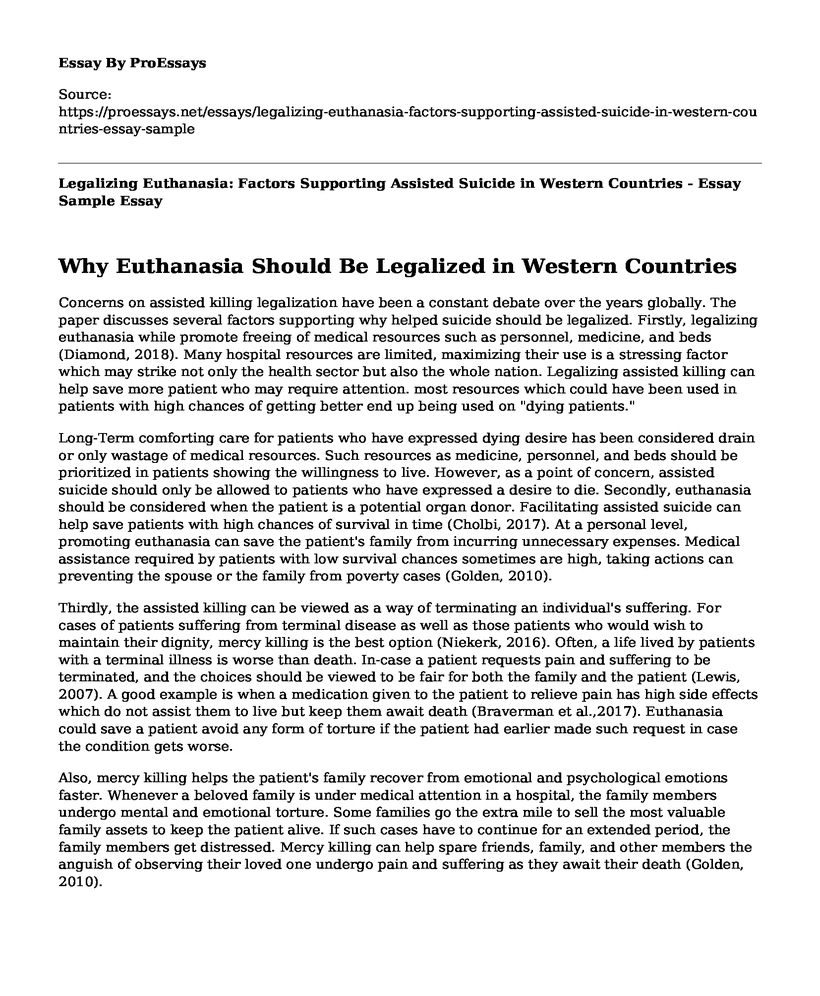Why Euthanasia Should Be Legalized in Western Countries
Concerns on assisted killing legalization have been a constant debate over the years globally. The paper discusses several factors supporting why helped suicide should be legalized. Firstly, legalizing euthanasia while promote freeing of medical resources such as personnel, medicine, and beds (Diamond, 2018). Many hospital resources are limited, maximizing their use is a stressing factor which may strike not only the health sector but also the whole nation. Legalizing assisted killing can help save more patient who may require attention. most resources which could have been used in patients with high chances of getting better end up being used on "dying patients."
Long-Term comforting care for patients who have expressed dying desire has been considered drain or only wastage of medical resources. Such resources as medicine, personnel, and beds should be prioritized in patients showing the willingness to live. However, as a point of concern, assisted suicide should only be allowed to patients who have expressed a desire to die. Secondly, euthanasia should be considered when the patient is a potential organ donor. Facilitating assisted suicide can help save patients with high chances of survival in time (Cholbi, 2017). At a personal level, promoting euthanasia can save the patient's family from incurring unnecessary expenses. Medical assistance required by patients with low survival chances sometimes are high, taking actions can preventing the spouse or the family from poverty cases (Golden, 2010).
Thirdly, the assisted killing can be viewed as a way of terminating an individual's suffering. For cases of patients suffering from terminal disease as well as those patients who would wish to maintain their dignity, mercy killing is the best option (Niekerk, 2016). Often, a life lived by patients with a terminal illness is worse than death. In-case a patient requests pain and suffering to be terminated, and the choices should be viewed to be fair for both the family and the patient (Lewis, 2007). A good example is when a medication given to the patient to relieve pain has high side effects which do not assist them to live but keep them await death (Braverman et al.,2017). Euthanasia could save a patient avoid any form of torture if the patient had earlier made such request in case the condition gets worse.
Also, mercy killing helps the patient's family recover from emotional and psychological emotions faster. Whenever a beloved family is under medical attention in a hospital, the family members undergo mental and emotional torture. Some families go the extra mile to sell the most valuable family assets to keep the patient alive. If such cases have to continue for an extended period, the family members get distressed. Mercy killing can help spare friends, family, and other members the anguish of observing their loved one undergo pain and suffering as they await their death (Golden, 2010).
Conclusion
When a patient's health is in a vegetative state, mercy killing should be highly considered. Some diseases are not easy to treat hence leave a patient with severe pain and suffering, which force the patient to have a desire to take their own life. Facilitating assisted killing will ensure the patient's dignity is kept as well as reducing their suffering. The family is also saved from incurring extra expenses to maintain costly patient's life. Limited resources, such as medical personnel, medicine, and beds, are utilized more beneficially. Therefore, when a patient is hopeless in living and a vegetative state, that they have consented to their death, no medical practitioner, family member, or government law should prevent fulfilling their wish. However, proper channels should be put in place to ensure lethal cases are not intertwined with assisted killing.
References
Akabayashi, A. (2002). Euthanasia, assisted suicide, and cessation of life support: Japan's policy, law, and an analysis of whistle blowing in two recent mercy killing cases. Social Science & Medicine, 55(4), 517-527. doi:10.1016/s0277-9536(01)00184-8
Braverman, D. W., Marcus, B. S., Wakim, P. G., Mercurio, M. R., & Kopf, G. S. (2017). Health Care Professionals' Attitudes About Physician-Assisted Death: An Analysis of Their Justifications and the Roles of Terminology and Patient Competency. Journal of Pain and Symptom Management, 54(4), 538-545.e3. doi:10.1016/j.jpainsymman.2017.07.024
Cholbi, M. (2017). Dignity and Assisted Dying. Oxford Scholarship Online. doi:10.1093/oso/9780190675967.003.0009
Diamond, J. A. (2018). Dying for Others or Dying for God? Oxford Scholarship Online. doi:10.1093/oso/9780198805694.003.0008
Falconer, Alexander, Lord Falconer of Halkertoun (d 1671). (2017). Oxford Dictionary of National Biography. doi:10.1093/odnb/9780192683120.013.9106
Golden, M., & Zoanni, T. (2010). Killing us softly: the dangers of legalizing assisted suicide. Disability and Health Journal, 3(1), 16-30. doi:10.1016/j.dhjo.2009.08.006
Lewis, P. (2007). Rights to Assisted Dying. Assisted Dying and Legal Change, 12-42. doi:10.1093/acprof:oso/9780199212873.003.2
Salari, S., & Sillito, C. L. (2016). Intimate partner homicide-suicide: Perpetrator primary intent across young, middle, and elder adult age categories. Aggression and Violent Behavior, 26, 26-34. doi:10.1016/j.avb.2015.11.004
Cite this page
Legalizing Euthanasia: Factors Supporting Assisted Suicide in Western Countries - Essay Sample. (2023, Feb 16). Retrieved from https://proessays.net/essays/legalizing-euthanasia-factors-supporting-assisted-suicide-in-western-countries-essay-sample
If you are the original author of this essay and no longer wish to have it published on the ProEssays website, please click below to request its removal:
- The Role of the Federal Government in Health Care
- Drug Abuse in Athletes: The Need for Weed Essay
- Essay Example on Major Practice Patterns for Controlling Dyslipidemia
- Covid-19: A Potent Coronavirus Ravaging the World - Essay Sample
- Essay Example on Informatics Programs to Curb Spread of Infectious Diseases
- Essay Example on 83-Year-Old Woman's Journey Through Late Adulthood: An Interview
- Paper on Comparing US & Canadian Healthcare Systems: A Look at GDP Expenditures







